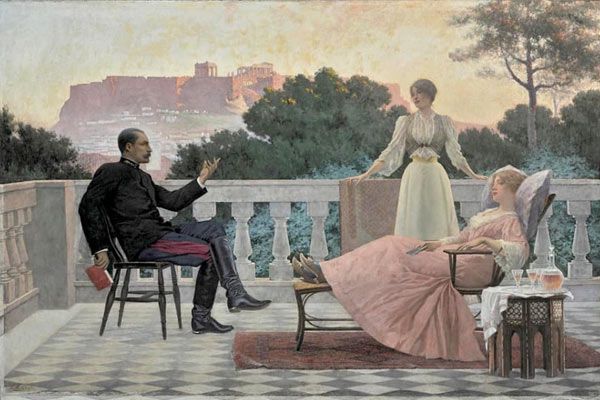
The birth of modern Greece · Louvre Museum
From September 30, 2021 to February 7, 2022, the Louvre Museum presents "Paris - Athens. The Birth of Modern Greece, 1675-1919", an exhibition that studies the cultural, historical and artistic factors that led to the definition of modern Greece.
Jacques Rizo - Athenian Evening - 1897Alfred-Nicolas Normand - Temple of Hadrian
Source: Louvre Museum. Images: Iakovos Rizos (Jacques Rizo): "Athenian Evening" (or "On the Terrace"), 1897. Oil on canvas. National Gallery of Greece ·· Alfred-Nicolas Normand: " Temple of Hadrian," 1852. Photograph. Musée d'Orsay, Paris.
This year 2021 marks the bicentenary of two important events for our concept of Greece: on the one hand, on March 1, 200 years ago, the Venus de Milo, perhaps the most celebrated of all Greek sculptures outside Greece, arrived at the Louvre, while March 25th 1821 marks the beginning of the Greek War of Independence. The Louvre Museum has therefore decided to organize this exhibition, with the aim of highlighting the cultural, historical and artistic links between Greece and France.
"Paris - Athens. The Birth of Modern Greece, 1675-1919" devotes much of its exhibition space to archaeology, which underwent a major boost in the mid-19th century with the emergence of a more scientific approach to excavations. In 1870, the French School of Athens conducted its first excavations on Santorini, bringing to light a previously unknown history of Greece, the period before Classical Greece. A Delos mosaic and bronzes from the Delphi Museum illustrate the section of the exhibition devoted to archaeology.
Another section is devoted to the rediscovery of the Byzantine past, initiated in the 1840s by travelers such as Adolphe Napoléon Didron and Dominique Papet. As early as 1900, the archaeologist Gabriel Millet carried out the first systematic excavations of Byzantine sites.
Finally, the exhibition focuses on the entry into modernity and the construction of a European identity, showing the importance of the Universal Exhibitions of 1878, 1889 and 1900 in the development of the Greek artistic identity, as well as the geopolitical events that led to the profound changes experienced by Greece today in relation to the Greece of antiquity.
Read the full article

